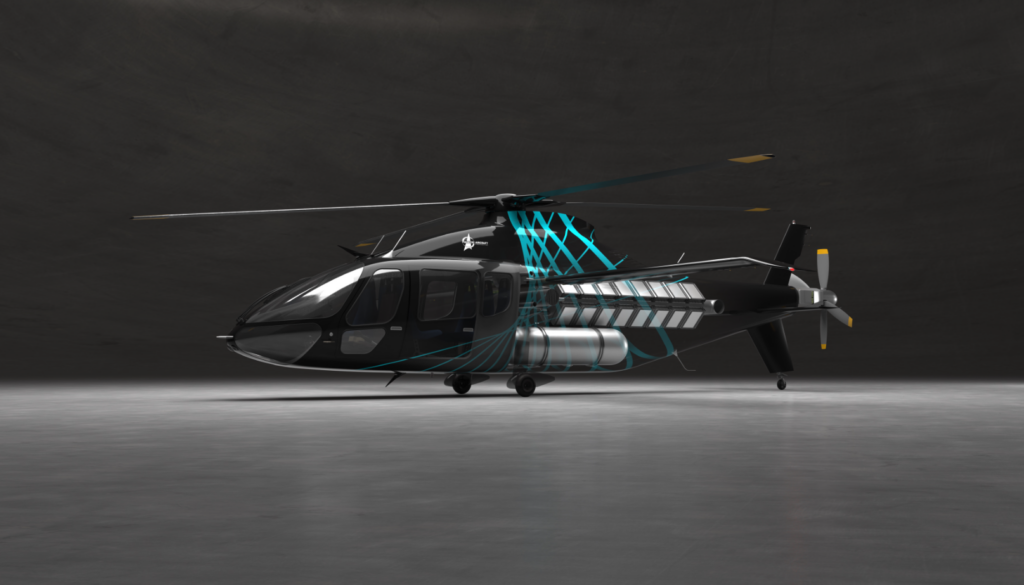
Piasecki Aircraft Corporation (PiAC) has been awarded a Small Business Innovation Research (SBIR) contract by the Department of Energy (DOE) for a hydrogen-powered urban air mobility (UAM) feasibility study.
The study, carried out by Piasecki, will focus on the feasibility of using hydrogen fuel cells as a power source for vertical takeoff and landing (VTOL) UAM vehicles, which are expected to play a significant role in the future of urban transportation.
The company has already completed the first phase of the multiphase program and is on track to begin the second phase later this year.
The SBIR program requires Piasecki to conduct a technical economic analysis (TEA), develop conceptual and preliminary designs, and ultimately develop and test a hydrogen fuel cell-powered VTOL UAM aircraft at scale. The first stage compares hydrogen technology to comparable internal combustion engine and battery rotorcraft to determine key metrics such as mission performance, Greenhouse Gases (GHGs) abatement potential, total cost of ownership, and technology readiness level.
The initial study conducted by Piasecki provided a detailed comparison between a baseline internal combustion Robinson R44 helicopter and three variants: hydrogen fuel cell propulsion with gaseous hydrogen, hydrogen fuel cell propulsion with liquid hydrogen, and battery-powered propulsion. Utilizing the DOE’s Techno-economic Energy & Carbon Heuristic Tool for Early-Stage Technologies (TECHTEST), the study demonstrated that hydrogen fuel cell and battery variants have negligible GHG emissions during use and that all variants abate more than 1,300 tons of GHG emissions over five years compared to the R44 powered by an internal combustion engine conducting the same UAM air taxi mission.
Operational efficiency is critical for urban air mobility, where the ability to support high utilization rates at required UAM mission distances without refueling can significantly enhance service offerings and economic viability. The study found that the liquid hydrogen fuel cell variant offered the best performance of the three variants:
- Superior range: The liquid hydrogen variant matched the range of the internal combustion variant (270 nautical miles) and demonstrated superior range compared with the gaseous hydrogen and battery variants.
- Less refueling: The high specific power of the High Temperature Proton Exchange Membrane (HTPEM) hydrogen fuel cells, coupled with the high energy density achievable with liquid hydrogen, allowed the liquid hydrogen variant to complete up to five 50-nautical mile sorties before refueling, compared with less than two sorties for the gaseous hydrogen variant. The battery-powered variant was not able to meet the minimum performance required by DoE’s nominal UAM mission profile without stopping to recharge.
- Reduced operating costs: The lowered direct operating cost of both hydrogen fuel variants allowed for the recoupment of marginal additional acquisition cost over the ICE variant: one to four years for the liquid and gaseous hydrogen variants, respectively. The battery-powered variant, while suitable for shorter-range missions, was never able to recover its acquisition cost premium, due to the limited cycle life of batteries when subjected to high discharge and recharge rates required by the VTOL UAM flight spectrum.
“The Department of Energy’s request for this groundbreaking study underscores the urgent need for innovative, affordable zero-carbon vertical mobility solutions to reduce traffic congestion in urban areas, and vehicular greenhouse gasses,” said John Piasecki, President and CEO of Piasecki Aircraft. “The results of our initial study reinforce the potential for hydrogen fuel cells to disrupt the $40 billion light helicopter replacement market and contribute to the growth of the emerging air taxi market. We are committed to developing innovative, sustainable solutions for the aviation industry and we look forward to further demonstrating the potential of hydrogen fuel cells to power urban air mobility.”





